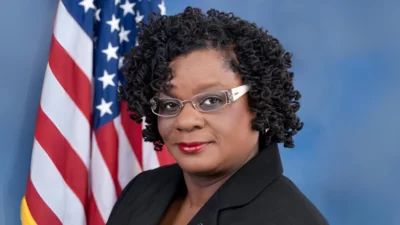LaTonya Johnson, Wisconsin State Senator for 6th District | Facebook
LaTonya Johnson, Wisconsin State Senator for 6th District | Facebook
According to the Wisconsin State Legislature's official website, the bill was described as follows: "sales and transfers of firearms and providing a penalty. (FE)".
The following is our breakdown, based on the actual bill text, and may include interpretation to clarify its provisions.
In essence, this bill enacts requirements for firearm transfers in Wisconsin, mandating that all firearm sales or transfers occur through a federally licensed firearms dealer, with mandatory background checks on transferees. Exceptions are provided for transfers to another firearms dealer, law enforcement, or the military, and transfers of antique firearms or those to family members by gift, bequest, or inheritance. Violations result in misdemeanor charges, fines of $500 to $10,000, and possible imprisonment up to nine months, with additional prohibition on firearm possession for two years post-conviction. The Joint Review Committee on Criminal Penalties may prepare a report as the bill potentially revises penalties for existing crimes. The effective date is the first day of the 10th month following publication.
The bill was co-authored by Representative Shelia Stubbs (Democrat-78th District), Senator Kristin Dassler-Alfheim (Democrat-18th District), Senator Dora E. Drake (Democrat-4th District), Senator Jodi Habush Sinykin (Democrat-8th District), and Senator Dianne H. Hesselbein (Democrat-27th District). It was co-sponsored by Representative Clinton M. Anderson (Democrat-45th District), Representative Deb Andraca (Democrat-23rd District), and Representative Margaret Arney (Democrat-18th District), along with 41 other co-sponsors.
LaTonya Johnson has authored or co-authored another 31 bills since the beginning of the 2025 session, with all of them being adopted.
Johnson graduated from Tennessee State University in 1997 with a BS.
Johnson, a Democrat, was elected to the Wisconsin State Senate in 2017 to represent the state's 6th Senate district, replacing previous state senator Nikiya Harris Dodd.
In Wisconsin, the legislative process starts when a senator, constituent, group, or agency proposes an idea for a bill. After drafting, the bill is introduced, numbered, and referred to a committee for review and public input. If approved, it moves through three readings and votes in both the Senate and Assembly. Once both chambers pass the same version, the bill goes to the governor, who can sign it, veto it, or let it become law without a signature. Only a small share of bills introduced each session ultimately become law. You can learn more about the Wisconsin legislative process here.
| Bill Number | Date Introduced | Short Description |
|---|---|---|
| SB336 | 06/19/2025 | Sales and transfers of firearms and providing a penalty. (FE) |
| SB332 | 06/19/2025 | Prohibition against undetectable firearms, possessing a frame or receiver of a firearm without a serial number, and providing a penalty |
| SB330 | 06/19/2025 | Waiting period for purchase of handguns |
| SB329 | 06/19/2025 | Extreme risk protection temporary restraining orders and injunctions, making an appropriation, and providing a penalty. (FE) |
| SB250 | 05/09/2025 | Prohibiting abandonment of a boat and providing a penalty |
| SB187 | 04/14/2025 | Study of guaranteed employment grant program and making an appropriation. (FE) |
| SB135 | 03/14/2025 | Special observance days in schools |






 Alerts Sign-up
Alerts Sign-up